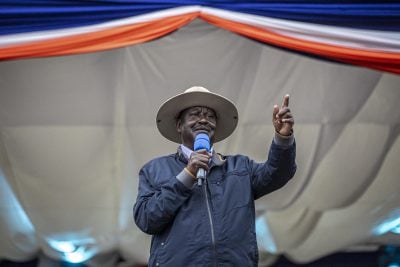This article was produced with the support of AFAWA
Affirmative Finance Action for Women in Africa (AFAWA), an initiative of the African Development Bank, supported by the Women Entrepreneurs Finance Initiative (We-Fi), participating G7 countries France, Italy, Canada, Germany as well as Netherlands and Sweden, aims to address one of the most vexing challenges on the continent: bridging the $42bn financial gap facing women in Africa. While finance is generally hard to come by in Africa, women in the continent face a particularly arduous climb to access funding for their small businesses. According to Jules Ngankam, group chief executive officer of AGF, “the question we are addressing is how to support women and increase their productivity to fully participate in the GDP of the African economy. Through the AFAWA Guarantee for Growth program, we are de-risking financial institutions that on-lend to women-led SMEs thus increasing their appetite for this target market.”
It is estimated that as many as a quarter of African women are engaged in one entrepreneurial activity or the other. There is a triple barrier between these women and the financing they need to build their businesses. Lending to women is thought to be riskier, so even when they are successful, they tend to pay higher interest rates than men. A history of gender imbalances often means that they do not have the collateral and other guarantees that traditional financial institutions require. Those institutions often do not have the capacity to fully appreciate the particular circumstances of women entrepreneurs and are thus, by extension, incapable of designing and activating the appropriate instruments and products to respond to them. Women are further disadvantaged by regulatory and legal systems that do not recognise their unique characteristics and end up hindering, rather than facilitating, their participation in business.
And yet, according to the African Development Bank, women are more likely to repay loans. They are also known to reinvest up to 90% of the proceeds from their business in food, health, education and other social and economic necessities for their households.
For women entrepreneurs to earn more, therefore, would be as good for financial institutions as it would be for African societies generally. It is this conviction that drove the African Development Bank and AGF to launch the AFAWA Guarantee for Growth program to de-risk women lending on the continent and change financial institution’s approach to the “women segment” of the market. The concept is simple and yet impactful. Working with lending institutions, and armed with a $250m risk-sharing instrument managed by the AGF, the initiative aims to unleash a substantial $3bn in financing specifically targeted towards women-led businesses across the African continent. The idea is to bridge the financing gap and empower women entrepreneurs by providing them with access to capital, thereby fostering economic growth, gender equality, and sustainable development throughout Africa.
A mission to empower women
According to Dr Beth Dunford, vice president for Agriculture, Human and Social Development at the African Development Bank, “empowering women entrepreneurs in Africa is a mission we feel strongly about at the African Development Bank and we are delighted to share the vision and mindset with like-minded partners and donor countries.”
“When we join forces, we truly make a difference for Africa’s women-led businesses and to help improve the quality of life for the people of Africa,” Dunford added.
Despite the strides made in advancing inclusive finance in Sub-Saharan Africa, the disparity in access to financial services between genders remains high. According to the 2021 Global Findex Report by the World Bank, while 61% of adult males in Sub-Saharan Africa have access to finance, only 49% of females do. Although there was a reduction in the gender gap from 9% to 6% – the first in the developing world since 2011– a significant number of women – approximately 745m – still lack access to financial services globally.
Specifically in Sub-Saharan Africa, the gender gap in access to finance stands at 12%, surpassing the average of 6% that pertains across the developing world, as reported in the World Bank’s 2021 Findex report. The gender finance gap in Africa has been placed at $42bn annually. Ngankam says that “in Africa, 70% of women are excluded financially, including in the areas of access to credit, land ownership, job opportunities, leadership positions and wealth creation. These imbalances have been one of the factors limiting Africa from reaching its full potential.”
More than just money
The AFAWA Guarantee for Growth program model is built on more than just making money available to women.
The money is advanced through partner financial institutions, with which AFAWA shares the risk (up to 75% in some cases). The initial $250m risk-sharing mechanism under the Guarantee for Growth program is expected to leverage up to $2bn in financing facilities to women SMEs by 2026. To further incentivise institutions, AFAWA has implemented a ratings system to assess financial institutions based on the proportion and calibre of their lending to women. Lenders who excel according to this system will receive preferential financing terms from the African Development Bank, serving as a catalyst for further investment in women-led businesses and fostering a more inclusive financial ecosystem.
The success of AFAWA Guarantee for Growth program, in large part, depends on these partner financial institutions, who play the last mile role and actually deliver the resources where they are needed.
In addition to this, AFAWA also offers advisory services through technical assistance to financial institutions, guiding them to effectively implement product portfolios tailored to the needs of women. Additionally, AFAWA focuses on bolstering the capacity of women entrepreneurs through comprehensive training programs aimed at enhancing business productivity and fostering growth. By equipping women with the necessary skills and knowledge, AFAWA aims to deliver more bang for its buck, ensuring that money lent delivers the optimum impact.
Impact on the ground
On the ground, the impact of the program is already beginning to show. In Rwanda, Bernadette Umunyana has expanded her company’s workforce from 2 to 39 employees, thanks to support from Access Bank’s “W” program.
In Kenya, Mary Thou tackled her business’s cash flow obstacles by participating in Credit Bank’s “Elevate Her” program.
Meanwhile, in Togo, the Nana Benz, renowned for their fabric creations, have managed to scale their businesses through AFAWA-backed financing.
These success stories underscore the transformative impact that AFAWA is making for women entrepreneurs around the continent. That is the message, at least in part, that the AFAWA team have taken on the road since 2022 with stops in Tanzania, Angola, the Democratic Republic of Congo, Ghana, Djibouti, Congo, Kenya, Nigeria, Mozambique and others. In Ghana Dr. Ernest Addison, the governor of the central bank, endorsed the campaign: “Promoting gender-inclusive finance serves as a catalyst for rapid, sustainable, and resilient economic growth and socio-economic development.” Around the continent, women will be saying amen to that.

 Sign in with Google
Sign in with Google 



